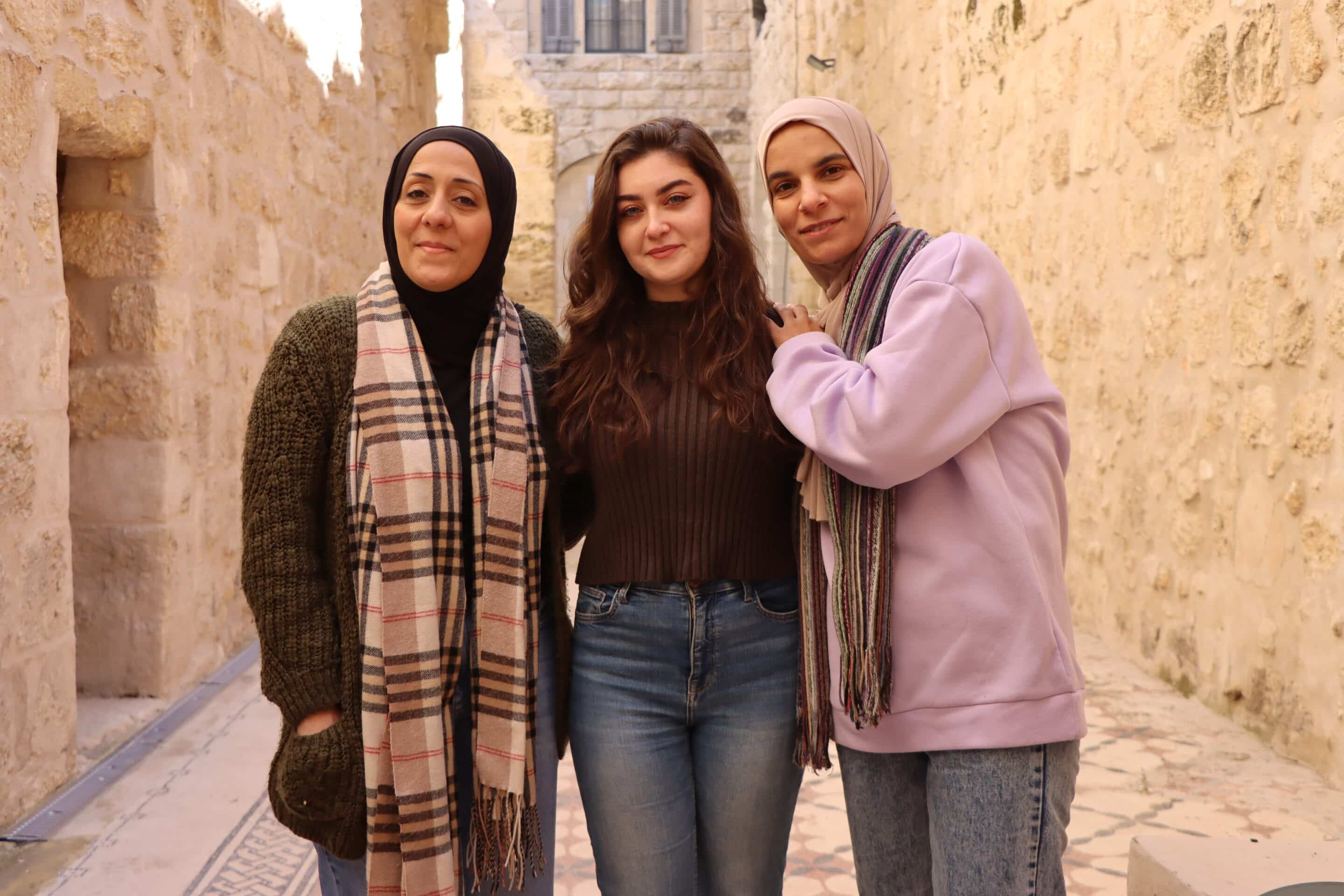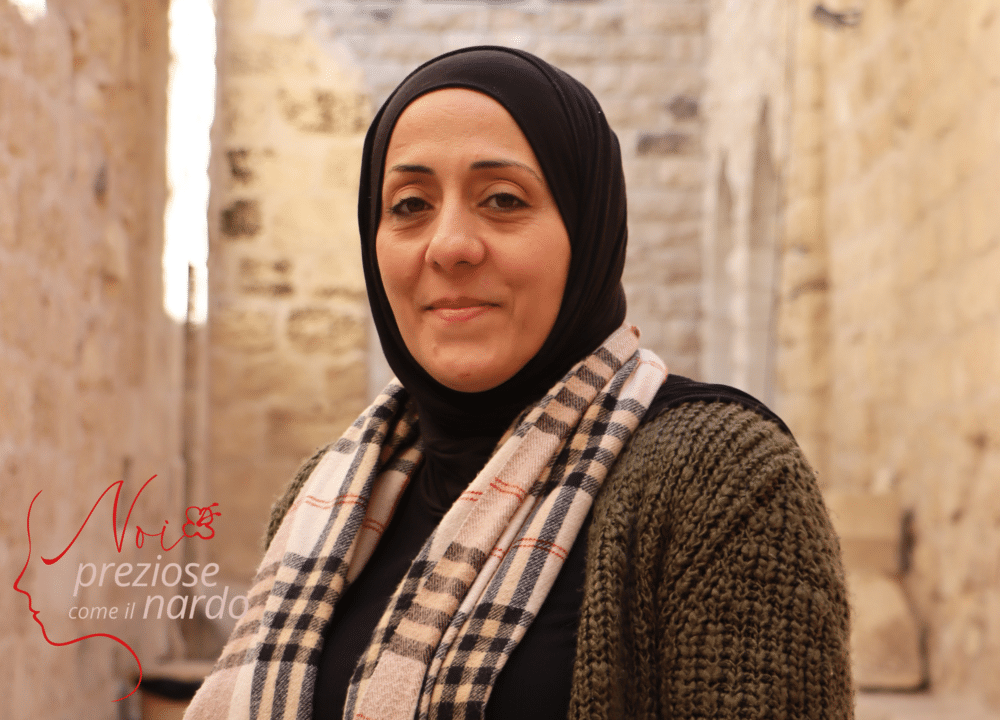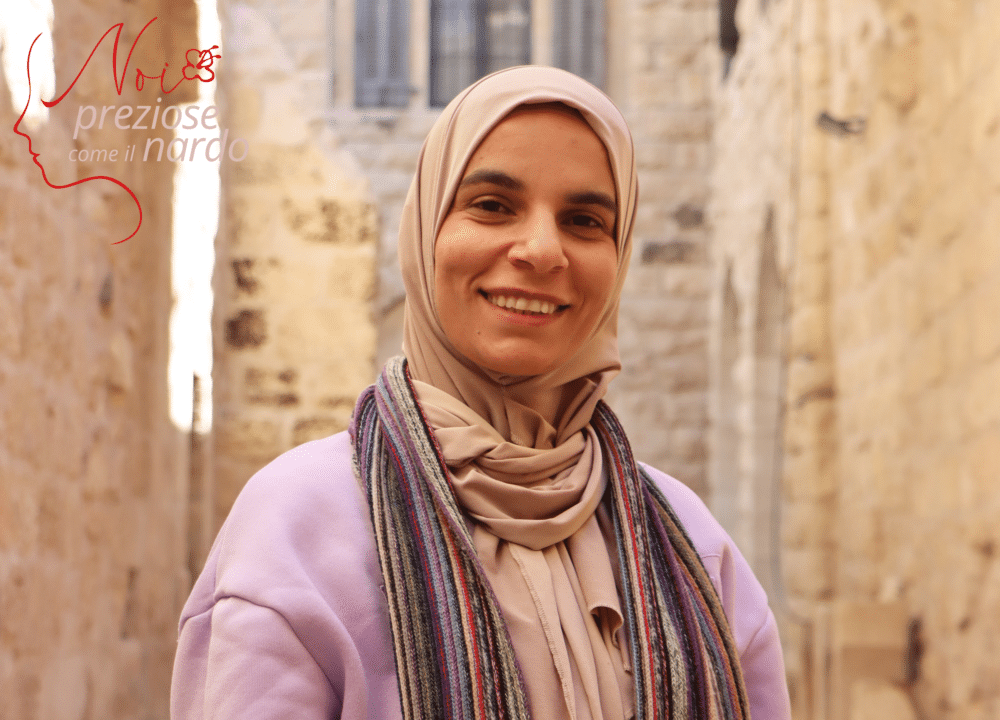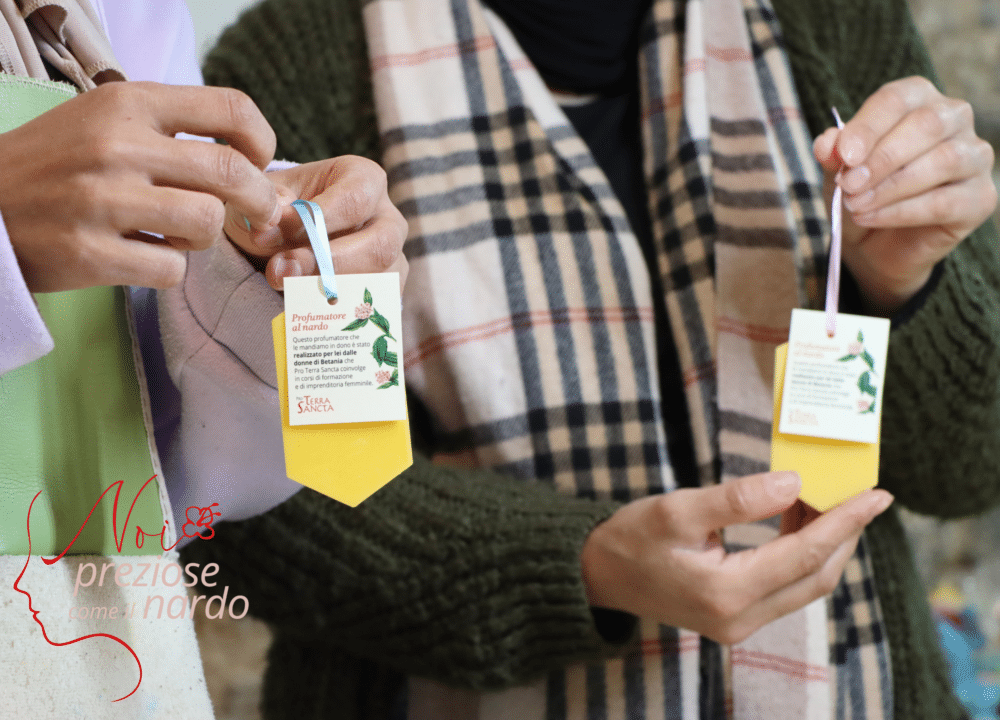
Maisa and Saida: As Precious as Nard
“This commitment has positively changed my life and my mood: not having had the opportunity to continue my studies, this artisanal work is just right for me.” The story of Saida and Maisa, two women from Bethany who are rewriting their futures.
Maisa
“My biggest dream would be to travel.”
“This job has been a breath of fresh air for me, since I don’t have the freedom to move around to find a job”: a breath filled with the sweet and spicy fragrance of Eastern flowers fills Maisa’s lungs, within the stone walls of the artisanal workshop in Bethany.
Maisa has a gentle face—like the scent of Nard: her dark eyes subtly reveal a hidden sadness, framed by her black veil. As she works, she seems lost in thought, yet her face maintains a calm, slightly enigmatic expression that stays in her eyes.

“I’m 42 years old and a Muslim. I was born in Yemen, but when I was 14, my family and I moved to Palestine, where my parents were from. Now I live in Abu Dis, near Bethany. I come from a big family with 7 sisters and 2 brothers.” Maisa married young: “I got married at 19 and soon had two children.”
“After a few years in Palestine, I began studying Health Administration at Al Quds University in Abu Dis. It wasn’t easy studying while raising a family, but I made it. I’m proud of my degree.” Her proud smile curves her lips as she repeats, “I’m proud of my degree.”
Still, despite her education, she had never found a job until she came across the local crafts project: “A friend who had taken part in a candle-making workshop organized by Pro Terra Sancta told me about the opportunity to work in a candle production lab. At first, I was interested from a financial point of view: I wanted to earn some money because I was unemployed.”
It’s hard to be unemployed in a Palestine where everything is at a standstill. What started as a financial opportunity for Maisa turned into something more: a newfound sense of freedom. “Life now [after the escalation of the conflict on October 7, 2023, Ed.] is suffocating: moving between Palestinian cities has become more difficult, checkpoints have increased, and we spend hours in line just to get through. I’m also increasingly afraid for the safety of my teenage children, and that hurts.”
This closure has made job-hunting even harder: “Before October 7, Israel gave permits for Palestinians to work in Israel. After October 7, everything stopped, and finding a job became impossible.”
Without freedom of movement, it’s impossible to work. It feels like being imprisoned. For Maisa, “my biggest dream would be to travel.”
Beyond the economic benefit, today she feels a strong desire for freedom: “After starting this candle-making activity, I realized I liked it because it gave me the chance to leave the house every day, meet new people, and build relationships. I’ve met many Italians, and through them, I’ve gotten to know a culture and religion different from mine, which has been very interesting.”
Saida
“Being away from my family and forbidden to travel caused me so much pain.”
Like Maisa, Saida’s greatest wish was to travel—but in her case, to return home. Saida is not Palestinian but Jordanian: “I was born in Amman to Palestinian refugee parents originally from a city called Lod (now part of Israel). I never completed my studies. I got married at 15 and a half to a Palestinian from Bethany, so I had to leave my family and live in a place I didn’t know.”

As a very young woman living in a foreign country, Saida also faced the impossibility of returning home—even just to hug her family again: “For ten years I only had a residency permit issued by the Israeli Ministry of the Interior. This permit didn’t allow me to travel, so I was never able to visit my family in Jordan. Only after ten years in Palestine did I receive a Palestinian ID card.”
Ten years without seeing her mother, father, and siblings. Ten long years where, even as she built a life and a family of her own (Saida has four children—two girls and two boys, now young adults), her happiness was tinged with present hardships and fear for the future.
Saida has always loved art: her delicate hands have over the years created ceramics and painted canvas.
“I’ve always been a creative person and I love art and crafts. I’ve taken many courses—embroidery, ceramics… Despite my skills, I could never start a business because I lacked the capital.”
That’s where the project ‘We, Precious as Nard’ came in like a godsend: “I was very excited to start this activity because the resources were there—I just had to apply my experience and find ways to improve candle production. This job gives me a lot of satisfaction and allows me to express myself creatively. I enjoy creating new candle shapes with different colors and scents… I go home excited after my day at the lab and show my kids pictures of what I made—that makes me really proud.”
Saida is proud of what her hands create: the chance to invent shapes, colors, and fragrances—to design a room’s atmosphere through scent—makes her feel like the protagonist of her own story.
“This commitment has positively changed my life and my mood. Not having had the chance to continue studying, this kind of artisanal work is perfect for me. When I work, I forget my problems and time flies. I go home satisfied and keep thinking about how to improve our products and how to create new ones.”
Saida’s face is warm and welcoming: her smile seems like a gentle invitation to share a moment of kindness. Despite the hardships she’s faced—and still faces—there’s nothing closed-off or bitter about her. “Thanks to this work, I’ve been able to give more to my children—something I couldn’t do before. This job has given me hope and positivity: I truly hope we’ll be able to continue it.”

For Easter, Pro Terra Sancta commissioned the small Bethany workshop to produce 30,000 nard-scented diffusers to be mailed to donors. Beyond being a gift for those who support Palestine and the Holy Land—a fragrant reminder of those places—this project was a chance for the artisans to prove themselves.
Thanks to the order, they were able to work for months, spending their days selecting fragrances, carefully pouring wax into molds, and earning a wage: a job that helps fill the void left by war, restricted movement, and the drop in tourism that has left many Palestinian workers without income.